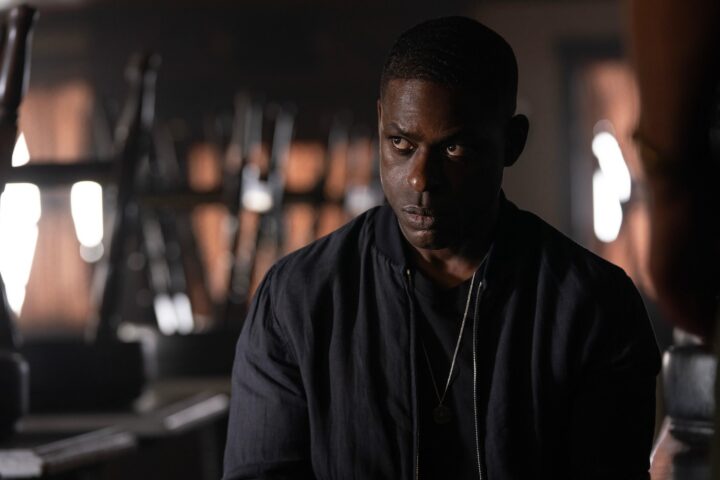“Life is like a parody of your favorite song.” That’s according to the grizzled narration that opens Weird: The Al Yankovic Story. “You think you know all the words and then…surprise.” Smash cut to Al (Daniel Radcliffe) as he’s rushed into the emergency room on a stretcher—bruised, bloodied, and on the verge of death after a horrible accident. You don’t need to be well versed in the real Weird Al Yankovic’s history to immediately gather that this, and pretty much all of the subsequent events in this quasi-biopic, aren’t at all true. Keeping in line with the legendary comedy singer’s artistic legacy, director Eric Appel’s film, co-written with Yankovic, instead acts as a broad parody of films about famous musicians.
Weird began life almost a decade ago as a Funny or Die-produced fake trailer, written, directed, and edited by Appel and starring Aaron Paul as an alcoholic, fame-hungry Weird Al—essentially, the exact opposite of the polite and humble real-life Yankovic. That was a perfect little self-contained joke that didn’t exactly feel like it necessitated a follow-up, yet Appel and Yankovic giddily take on the challenge to expand that hilarity to feature-length. While the basic storyline and almost all of the gags from the original trailer are directly reproduced, Weird accordingly—or should I say, accordion-gly?—takes everything to glorious heights of ridiculousness.
Loose details from Yankovic’s life are henceforth applied to all of the expected clichés. We’re first introduced to the teenage Al (David Bloom) as he’s growing up in an anonymous suburban neighborhood with his loving mother, Mary (Julianne Nicholson), and stern factory worker father, Nick (Toby Huss), who hilariously commands his son to “stop being who you are and doing the things you love.” What Al loves to do, of course, is play the accordion (he wows his friends at a high school polka party with his talents) and once he’s old enough to move out, he heads to L.A. to realize his dream of reimagining the lyrics to popular songs.
Subsequently, Weird proceeds to craft a series of giddily on-the-nose origin stories for several of Yankovic’s signature hits; “My Bologna”, for instance, is conceived when the Knack’s “My Sharona” comes on the radio while Al is making bologna sandwiches. After being discovered by cult figure Dr. Demento (Rainn Wilson), Al quickly achieves megastar status within a loopy reality where polka music and parody songs become as huge as Elvis’s and the Beatles’s biggest hits. And Weird works its way through all these scenes in perfectly deadpan fashion, recalling the famous comedy parodies of Zucker, Abrahams, and Zucker (with which Yankovic was intimately acquainted, having cameoed in all three Naked Gun films).
Radcliffe, one of the loosest and most likeable actors of his generation, turns out to be the perfect embodiment of this film’s bizarre-world Al. Noticeably shorter and looking nothing like Yankovic—a perfect little gag in its own right—outside of the curly hair and Hawaiian shirts, the actor nevertheless brings an endearing innocence and enthusiasm to his role that’s quintessentially Al. While it’s clear that’s he’s lip-synching to Yankovic’s tracks, he still gloriously loses himself in performance sequences of Weird Al’s riotously inventive live shows. And Radcliffe’s manic impersonation is propped up by a supporting cast of crack comic talent, from Huss, especially in a ludicrous bonding scene with Al where he confesses his upbringing in an Amish community (cue Al getting the inspiration for “Amish Paradise”), to Will Forte, who plays an asshole record executive whose snippy petulance verges on complete psychosis.
The film’s second half is taken up by Al’s alcoholism and fall into self-loathing, spurred on by his struggles to be taken seriously for his original songs. (In another of the film’s clever distortions of reality, Al triumphantly records “Eat It” as his first original song before Michael Jackson parodies it soon after with “Beat It,” leading everyone to automatically assume that Jackson’s song came first.) His decline is further accelerated by a burgeoning romantic relationship with Madonna (Evan Rachel Wood), who desperately wants Al to parody one of her own songs.
Wood’s caricature of ’80s-era Madonna is on point, but rather than satirize the mechanics of tumultuous celebrity relationships, the film incessantly positions the Queen of Pop as a manipulative bad influence and the primary reason for Al’s deterioration. Especially given the nature of Madonna’s real-life relationship to Sean Penn around this time period, this stale joke starts to bog Weird down, rooted as it is in outdated sexist notions. Madonna may be known for her careerist ambition and tenacity, but the film looks down on her here in ways that it doesn’t the rest of the largely male-dominated ensemble, who exude the same qualities.
Weird continues to tread water as it begins to indulge in action-movie bombast in its third act. In an extended homage to the Rambo fantasy sequence in UHF, Al goes down to South America to rescue Madonna after she’s been kidnapped by his number one super fan, Pablo Escobar (Arturo Castro). But just when you think the film has, well, lost itself in the jungle forever, Appel and Yankovic delightfully wrap things up with an exquisitely staged awards show climax that sets a high bar in terms of anarchic absurdity. Ultimately, in all its gleefully self-deprecating fabrications and unbridled chaos, Weird is exactly the kind of biopic fans would desire from the man who is, in the words of the film, “maybe not the best accordion player but certainly the best-known accordion player in an extremely specific genre.”
Since 2001, we've brought you uncompromising, candid takes on the world of film, music, television, video games, theater, and more. Independently owned and operated publications like Slant have been hit hard in recent years, but we’re committed to keeping our content free and accessible—meaning no paywalls or fees.
If you like what we do, please consider subscribing to our Patreon or making a donation.





Is there a specifically North American market for a film about someone I suspect is little known outside of it? This Brit’s only knowledge of Yankovic is via the aforementioned Naked Gun films. Maybe I just led a sheltered life. The proof will be in how widely this film is shown and in audience response.